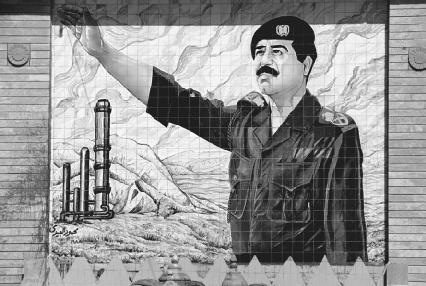
The execution of Saddam, which was, I think, a necessary step, has a very serious downside: it provides confirmation among the majority Sunni Arab population (and other Sunnis, as well) of a conspiracy among “Crusaders,” Shi’a, and the Persians to destroy the unity of the the Arab world. The BBC offers a small flavor, ” No Arab euphoria at Saddam death.”
All the more reason for the U.S. to disengage from the region.
UPDATE: Robert Baer’s take on the issue, “Saddam the Martyr.”
FURTHER UPDATE: I saw the telephone-camera video of the execution. It was a very disturbing confirmation of the sectarianism of the act, which promises worse in the future. It’s clear that some of the participants in the conflicts want simply to inflame them further, with al Qaeda in Iraq doing so very effectively on one side (the destruction of the Golden Shrine in Samarra was a deliberate and effective trigger to sectarian revenge attacks by Shi’a) and by the forces of Moqtada al Sadr, on the other. The picture continues to get bleaker and bleaker.










It was extreemly necessary that a documentary film be demonstrated to the world together with the execution vedeo.
What he had done to his own people as well as doccumentary films of his barbarious sons( like father like son ! ) Something like the lions that they used to breed in their castle to they’d just throw their dear fiends to when they dissagreed upon playing cards. .
Moreover there were many scenes that are archived of Iraqui women damning him on TV for what he ‘d done to their sons…etc
It was of great importance for new generations as well as the old ones as it is only human that man forgets and thinks only of what he sees.
It’s better late than never. Please try to collect all these doccumentary shots to convince peole that the United States is not picking on Arabs. On the contrary, it is helping them to get their human rights when they have been passive for ages.
Why don’t you add a sentence that says ,
” U.S. is not picking on the Arabs. On the contrary, It is helping them to lead a fair life when no action is taken from within.
The U.S. cares for others sometimes before itself. It only sees that peace spreads everywhere.
Being a great power in the world , It is doing it’s job as should be. The United States is there for everybody – even if it is on the other side of the globe.
NB. I am a pesrson who is very far from politics. I also hardly follow it. This oppinion is based on the weak idea that I have.
Thanks
I’m afraid that I don’t agree. The evil deeds of Saddam don’t by themselves justify U.S. interventionism. A lot more would have to go into a justification, such as that he posed a threat to the U.S., which, as we now know, was not really the case. Nor was that case made persuasively prior to the invasion. Moreover, although it’s a good thing that Saddam is not in power, the intervention has unleashed forces in Iraq that are also quite horrible, such as al Qaeda in Iraq and the Mehti Army, roving death squads, brutally violent ethnic cleansing, and the threat of a regional war. The policy of the U.S. has been generally quite disastrous.
I do agree that most of the discussions of the motivations for the invasion are quite puerile and implausible. Some people cannot understand that even very powerful people can simply be so wrong and can screw things up so badly. It’s manifestly not in any material interest of the U.S. government or — most certainly — of the American taxpayer or citizen to have intervened or to pursue a permanent empire in the region. Indeed, the evidence was clear at the start that, had oil and access to oil been the primary motivation, it would have been a lot easier and definitely cheaper just to lift the restrictions on exports of Iraqi oil. The option chosen was undoubtedly the most expensive and counter productive, from a purely economic point of view. So the U.S. government was motivated by other factors, and among them was the impulse to “humanitarian interventionism,” but that very impulse was not conjoined to much serious thought about the likely consequences of following it.